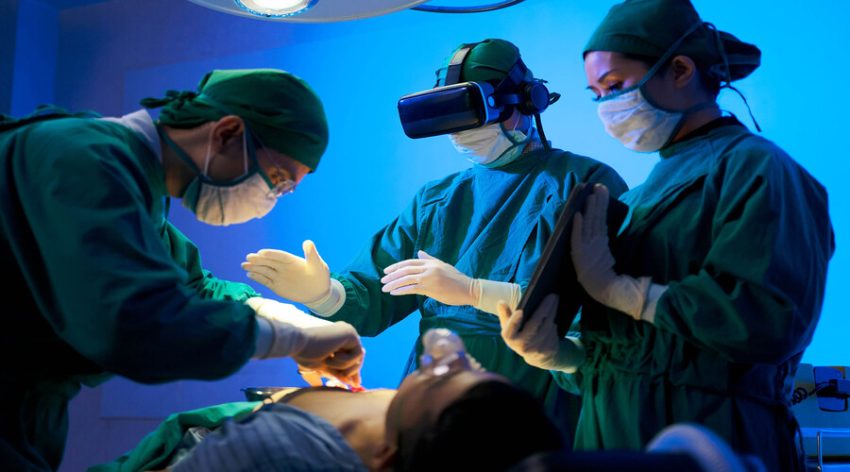In the ever-evolving landscape of healthcare, immersive training in the Metaverse has emerged as a powerful tool for educating and upskilling healthcare professionals. Leveraging virtual reality (VR) and augmented reality (AR) technologies, immersive training offers realistic simulations, interactive scenarios, and hands-on experiences that enable healthcare professionals to enhance their skills, improve patient care, and navigate complex medical procedures. In this article, we will explore the significance of immersive training in the Metaverse and its impact on the professional development of healthcare practitioners.
Introduction
Immersive training in the Metaverse leverages the power of VR and AR to create simulated environments that closely resemble real-life medical settings. Through realistic 3D models, interactive scenarios, and haptic feedback, healthcare professionals can gain hands-on experience, develop critical skills, and refine their decision-making abilities. This immersive approach to training provides a safe and controlled learning environment where professionals can practice complex procedures, simulate emergency situations, and collaborate with virtual colleagues.
Realistic Simulations and Scenarios
One of the key benefits of immersive training in the Metaverse is the ability to create realistic simulations and scenarios. Healthcare professionals can engage in virtual surgeries, emergency room simulations, and diagnostic challenges that closely resemble real-life situations. These simulations provide a valuable opportunity for professionals to apply their knowledge, practice technical skills, and refine their decision-making processes in a risk-free environment.
Interactive Learning and Skill Development
Immersive training fosters interactive learning experiences for healthcare professionals. Through VR and AR, practitioners can actively engage with virtual patients, medical equipment, and medical records, allowing for hands-on practice and skill development. They can interact with realistic anatomical models, visualize complex medical concepts, and perform procedures with precision. This interactive learning approach promotes deeper understanding, retention of knowledge, and the development of practical skills.
Collaboration and Teamwork

Immersive training in the Metaverse facilitates collaboration and teamwork among healthcare professionals. Virtual environments allow practitioners to collaborate with virtual colleagues, enhancing communication, decision-making, and interdisciplinary coordination. Through simulated team-based scenarios, professionals can learn to work effectively in interprofessional healthcare teams, improving patient outcomes, and fostering a patient-centered approach to care.
Continuing Education and Professional Development
Immersive training offers healthcare professionals opportunities for continuing education and professional development. By simulating new medical advancements, innovative procedures, and emerging technologies, practitioners can stay up-to-date with the latest developments in their field. They can learn and practice new techniques, explore alternative treatment options, and expand their knowledge base to deliver high-quality care to their patients.
Ethical Considerations and Challenges
While immersive training in the Metaverse presents numerous advantages, ethical considerations and challenges should be addressed. Ensuring patient privacy, informed consent, and maintaining a balance between virtual and real-world experiences are crucial aspects to consider. Furthermore, accessibility, cost, and technological requirements may pose challenges to widespread implementation of immersive training programs.
Important Points to Consider
- Enhancing Surgical Skills: Immersive training in the Metaverse has a profound impact on enhancing surgical skills for healthcare professionals. With the use of virtual reality (VR) and augmented reality (AR) technologies, surgeons can immerse themselves in realistic simulations that replicate surgical procedures. They can practice complex techniques, refine their skills, and improve their precision and confidence. By providing realistic haptic feedback, VR and AR create a controlled environment where surgeons can develop their abilities without any risk to actual patients. Immersive surgical training not only enhances the expertise of surgeons but also improves patient safety through increased competence and preparedness.
- Simulation-Based Emergency Response Training: Immersive training in the Metaverse plays a crucial role in preparing healthcare professionals for emergency situations. Through VR and AR simulations, practitioners can immerse themselves in realistic scenarios that simulate high-pressure emergency situations, such as cardiac arrests or trauma cases. They can practice their response skills, decision-making processes, and team coordination in a safe and controlled environment. The immersive nature of the training allows professionals to experience the intensity and urgency of real emergencies, leading to enhanced preparedness and improved performance in critical situations. Simulation-based emergency response training ultimately results in better patient outcomes and increased healthcare provider confidence.
- Virtual Patient Consultations: Immersive training in the Metaverse offers healthcare professionals the opportunity to conduct virtual patient consultations, transforming the way healthcare services are delivered. With VR and AR technologies, practitioners can remotely assess patient conditions, provide diagnoses, and offer treatment recommendations. This is particularly valuable for individuals in remote or underserved areas who may have limited access to healthcare. Virtual patient consultations enhance healthcare accessibility, reduce travel costs, and improve convenience for patients. By leveraging the capabilities of immersive technology, healthcare professionals can extend their reach and provide quality care to a wider population.
- Cultural Competency Training: Immersive training in the Metaverse plays a crucial role in enhancing cultural competency among healthcare professionals. VR and AR simulations can recreate diverse patient populations, exposing practitioners to various cultural backgrounds and healthcare practices. This immersive experience allows healthcare professionals to develop cross-cultural communication skills, empathy, and cultural sensitivity. By understanding different cultural contexts, healthcare providers can deliver care that is respectful, inclusive, and tailored to individual needs. Cultural competency training fosters effective communication, promotes patient-centered care, and ultimately leads to improved patient satisfaction and better health outcomes.
- Interprofessional Collaboration and Training: Immersive training in the Metaverse facilitates interprofessional collaboration by providing healthcare professionals with opportunities to practice teamwork and communication in simulated scenarios. VR and AR simulations allow practitioners from different disciplines to work together, improving interdisciplinary decision-making, shared care planning, and effective communication. Through immersive experiences, healthcare professionals can develop a deeper understanding of each other’s roles, enhance their collaboration skills, and strengthen the coordination of care. Interprofessional collaboration training in the Metaverse fosters a patient-centered approach and promotes a holistic approach to healthcare delivery.
Patient Empathy and Communication Skills:
Immersive training in the Metaverse provides a unique opportunity for healthcare professionals to develop patient empathy and enhance their communication skills. Through realistic simulations and interactive scenarios, practitioners can engage with virtual patients and practice active listening, effective communication, and empathy. By immersing themselves in the virtual world, healthcare professionals gain a deeper understanding of the patient experience and can better address their concerns and deliver compassionate care. Immersive training in patient empathy and communication skills cultivates stronger patient-provider relationships and leads to improved patient satisfaction.
Mental Health Training and Simulation:
Immersive training in the Metaverse is increasingly being utilized to provide mental health training and simulations for healthcare professionals. By leveraging virtual reality (VR) and augmented reality (AR) technologies, practitioners can engage in virtual scenarios that simulate various mental health conditions, such as anxiety or depression. Through these simulations, healthcare professionals learn to recognize symptoms, practice effective interventions, and develop a better understanding of the challenges faced by individuals with mental health disorders. Immersive training in mental health equips healthcare professionals with the knowledge and skills needed to provide empathetic support, reduce stigma, and deliver appropriate care to individuals experiencing mental health issues.
Pain Management and Non-pharmacological Interventions:
Immersive training in the Metaverse has demonstrated promising applications in the field of pain management, particularly through the use of VR and AR technologies. Virtual simulations create immersive environments that can distract patients from pain and offer non-pharmacological interventions. Healthcare professionals can learn and practice techniques such as virtual reality therapy, mindfulness exercises, and guided imagery to help patients manage pain, reduce reliance on medication, and improve overall well-being. Immersive training in pain management empowers healthcare professionals to explore innovative approaches to alleviate pain and enhance the quality of life for their patients.
Emergency Preparedness and Disaster Response:
Immersive training in the Metaverse plays a critical role in preparing healthcare professionals for emergency situations and disaster response. VR and AR simulations provide realistic scenarios that allow practitioners to develop essential skills in triage, resource allocation, and effective communication during high-stress situations. Through immersive training, healthcare professionals can experience and practice emergency response protocols, make quick decisions under pressure, and coordinate effectively with response teams. Immersive training enhances preparedness and ensures that healthcare professionals are equipped to provide optimal care during emergency situations and disaster events.
Ethical Dilemmas and Decision-Making:
Immersive training in the Metaverse offers healthcare professionals a platform to navigate complex ethical dilemmas and enhance their decision-making skills. Through virtual scenarios, practitioners can encounter challenging ethical situations and explore different approaches to resolve them. These simulations provide a safe space for professionals to critically analyze dilemmas, consider ethical principles, and make well-informed decisions. Immersive training in ethical dilemmas and decision-making equips healthcare professionals with the necessary tools and mindset to navigate ethical challenges confidently and ethically in their practice.
In conclusion, immersive training in the Metaverse has emerged as a powerful tool for healthcare professionals to enhance their skills, improve patient care, and navigate complex medical scenarios. Through the use of virtual reality (VR) and augmented reality (AR) technologies, practitioners can engage in realistic simulations, interactive scenarios, and immersive experiences that closely resemble real-life situations. This form of training offers unique benefits, such as the development of patient empathy, enhanced communication skills, and improved decision-making abilities.
Immersive training provides a safe and controlled environment for healthcare professionals to practice and refine their skills without the risk of harm to patients. It offers opportunities for practitioners to gain hands-on experience, learn from their mistakes, and explore innovative approaches to patient care. The ability to simulate diverse patient populations, emergency situations, and ethical dilemmas enables professionals to develop a deeper understanding of their respective fields and navigate complex challenges with confidence.
Furthermore, immersive training in the Metaverse promotes interprofessional collaboration, as healthcare professionals from different disciplines can come together in virtual environments to practice teamwork, communication, and shared decision-making. This collaboration fosters a patient-centered approach to care and prepares healthcare professionals to work effectively in interdisciplinary healthcare teams.
As technology continues to advance, immersive training in the Metaverse will play an increasingly significant role in healthcare education and professional development. It offers a transformative learning experience that complements traditional training methods and expands the possibilities for continuous learning, skill enhancement, and innovation in healthcare.
I’m a highly experienced and well-respected author in the field of Cryptocurrency. I have been writing on the subject for over 5 years now and have become an expert in the field. My work has been featured in many prestigious publications, including The Wall Street Journal, Forbes, and Business Insider. I’m a regular contributor to CoinDesk, one of the leading sources of Cryptocurrency news and information. In addition to my writing, I’m also a highly sought-after speaker on the topic of Cryptocurrency investing and trading. I have been invited to speak at numerous events around the world, including the World Economic Forum in Davos, Switzerland.

